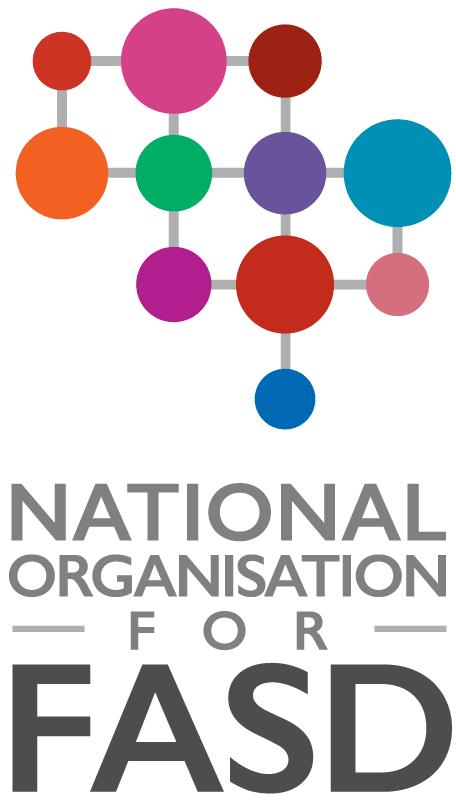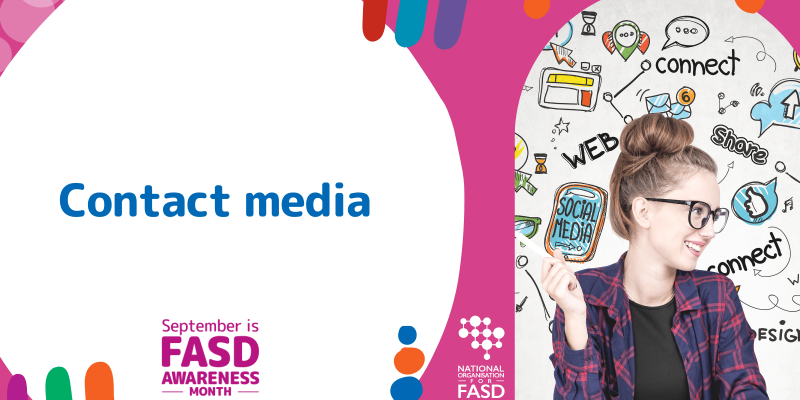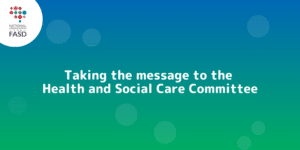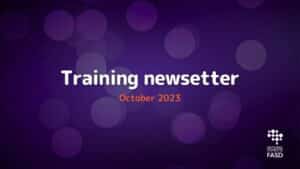It's here!!
Welcome to FASD Awareness Month
Contact the media and/ or make a pledge to raise awareness
Contact the media
Below is sample press release and a background sheet that you can provide (we also have word files you can download and attach).
How to find your local media?
Google your local paper or radio station. They will usually have contact emails for editors at the top or the very bottom of their websites. You also can contact them via twitter or other social media.
You can find some top tips for talking with the media here.
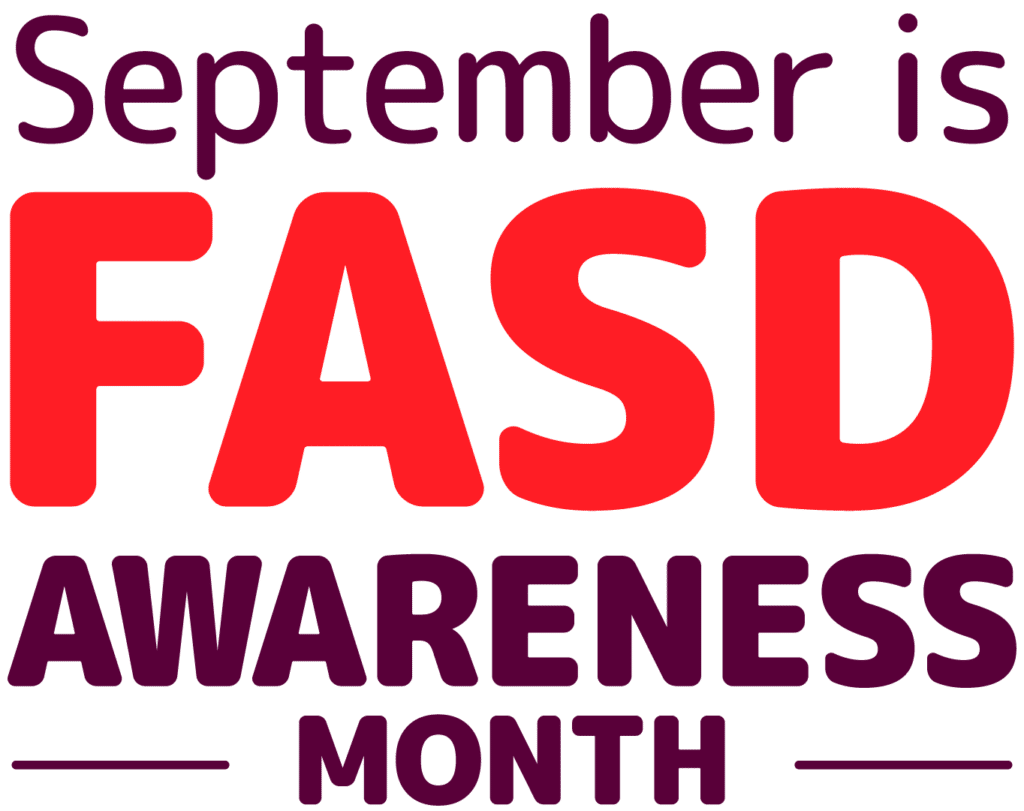
SAMPLE PRESS RELEASE
(Click here for a word version you can download and edit)
[Location], [DATE] – [NAME OF ORG OR PERSON] is celebrating international FASD day by [INSERT YOUR ACTIVITY]. On 9/9 advocacy groups all around the world focus attention on the health benefits of avoiding alcohol in pregnancy and the need to diagnose as well as support those with Fetal Alcohol Spectrum Disorder, a lifelong neurodevelopmental condition that can result from alcohol-exposed pregnancies.
[INSERT SHORT QUOTE ABOUT WHY YOUR GROUP/YOU ARE ACKNOWLEDGING FASD DAY. E.g. – X, a parent/carer of child/son/daughter with FASD said…]
FASD day is part of an FASD Awareness Month in the UK. Throughout the month, independent groups that comprise the FASD UK Alliance will be creating activities and actions encouraging members of their communities, policy makers, commissioners, practitioners, educators, social workers and individuals and families to pledge some action during the month to contribute to progress in either FASD prevention or diagnosis and support. They will use the hashtag #FASDUKPledge.
This is a particularly important year in the UK following policy statements by all major public health bodies alerting policy makers and practitioners to put in place measures to help prevent FASD and support those who have it and a recent prevalence study by the University of Salford which said that 2-4% of the population is likely to have FASD, a rate higher than autism, but most of these people are unrecognised, undiagnosed or misdiagnosed.
[Quote about how this will impact your work/family]
[Ends]
BACKGROUND INFORMATION
(Click here to download word version)
What is FASD?
“FASD results when prenatal alcohol exposure affects the developing brain and body. FASD is a spectrum. Each person with FASD is affected differently. While more than 400 conditions can co-occur, FASD is at its core a lifelong neurodevelopmental condition. All people with FASD have many strengths. Early diagnosis and appropriate support are essential, especially for executive functioning.” (Source: FASD: Preferred UK Language Guide, Seashell Trust/National FASD, 2020)
How many people have FASD?
A recent gold-standard study by the University of Salford showed that 2-4% have FASD. That’s a higher rate than autism. Most people with FASD are unrecognised, undiagnosed or misdiagnosed.
How is FASD diagnosed?
The SIGN 156 guideline is the guidance now across Scotland, England and Wales. It says that to have a diagnosis you need to have “Pervasive and long-standing brain dysfunction, which is defined by severe impairment…in three or more of the following neurodevelopmental areas of assessment”: motor skills; cognition; memory; neuroanatomy/ neurophysiology; academic achievement; language; attention; executive function, including impulse control and hyperactivity; affect regulation; or adaptive behaviour, social skills or social communication.
Alcohol in pregnancy in the UK
Over 40% of women in the UK use alcohol during pregnancy, making the UK the 4th highest rate of alcohol exposed pregnancies in the world.
What is the new NICE Quality Standard?
NICE Quality Standard 204 identifies areas for improving quality of care re FASD: advice on avoiding alcohol in pregnancy; prenatal alcohol exposure; referral for assessment; neurodevelopmental assessment; and management plan. Unlike guidance, local areas in England and Wales have to ‘have regard’ for Quality Standards and report on progress in improving care.
What is FASD awareness month?
The 9th day of the 9th month is International FASD Day. This is to draw attention to the importance of going alcohol-free for the 9 months of pregnancy. In the UK we celebrate September FASD Awareness Month. The National Organisation for FASD is providing resources for a month of action in 2022.
What is the FASD UK Alliance and #FASDUKPledge?
The FASD UK Alliance is a coalition of groups and individuals from across the UK who are united together for positive social change for those affected by Fetal Alcohol Spectrum Disorders (FASD). Affiliates include small local, regional and virtual groups as well as some of the country’s longest standing national organisations devoted to FASD, with links to international networks. The independent groups that comprise the FASD UK Alliance are all asking people throughout the month to pledge to do more to help raise awareness of FASD. All sister organisations in the Alliance will use hashtags: #FASDmonthUK and #FASDUKPledge
What is International FASD Day?
The 9th day of the 9th month is International FASD Day. This is to draw attention to the importance of going alcohol-free for the 9 months of pregnancy. In the UK we celebrate September FASD Awareness Month
Key official quotes
“There is no known safe level of alcohol consumption during pregnancy.”
NICE, Fetal Alcohol Spectrum Disorder Quality Standard 204 (2022).
“Drinking any alcohol can cause difficulties in pregnancy and can result in Foetal Alcohol Spectrum Disorder (FASD), causing lifelong disabilities for children. There is no safe time or safe amount of alcohol to drink during pregnancy.”
Public Health England,“Maternity high impact area: Reducing the incidence of harms caused by alcohol in pregnancy” (2020)
“There is no known safe level of alcohol consumption in pregnancy. Even low to moderate levels of PAE [prenatal alcohol exposure] can negatively impact a fetus and these adverse consequences can persist into adulthood.”
SIGN 156, “Children and Young People Prenatally Exposed to Alcohol” (2019)
“The government recognises the importance of FASD.”
Department of Health and Social Care, “FASD Health Needs Assessment for England” (2021)
“There is no ‘mild’ FASD.”
“FASD Health Needs Assessment for England” (2021)
“Prenatal alcohol exposure should be actively considered as a possible underlying cause for neurodevelopmental delay.”
SIGN 156, “Children and Young People Prenatally Exposed to Alcohol” (2019)
“The needs identified for this population group focus on: a lack of robust prevalence estimates in England; the importance of multi-sector working to support individuals through the life course; better training and awareness for health professionals; better organisation of services to improve accessibility; a need to develop innovative approaches to support those living with the condition.”
“FASD Health Needs Assessment for England” (2021)
“[W. Sussex] appears to be gatekeeping access to its services … The council has a duty to ensure there is sufficient educational provision available in its area to meet demand. The lack of suitable placements for the boy in the council’s SEN schools suggests it is not meeting this duty.”
Local Government and Social Care Ombusdman ruling (2021) that a local area couldn’t exclude someone with FASD from services for those with ‘autism and learning disability.’
“No specific public health messaging on fetal alcohol spectrum disorder (FASD) has been undertaken in the last five years.”
Maggie Throup, Parliamentary Under-Secretary for Health and Social Care, Hansard, 21 Sept 2021 (Note this coincides with the 2016 release of the CMOs’ guidance)
“If you are pregnant or think you could become pregnant, the safest approach is not to drink alcohol at all, to keep risks to your baby to a minimum.”
Chief Medical Officers guidance (2016)
“The Government take alcohol concerns, across the board, very seriously and even more so when they relate to pregnancy. We are making progress—I hope—to prevent future FASD cases, and trying to change the landscape on prevention and treatment for those affected. But there is not an ounce of complacency in us—there certainly is not in me. We will continue to work towards improvements in the area.”
Steve Brine, then Health Minister, Hansard, 17 Jan 2019
